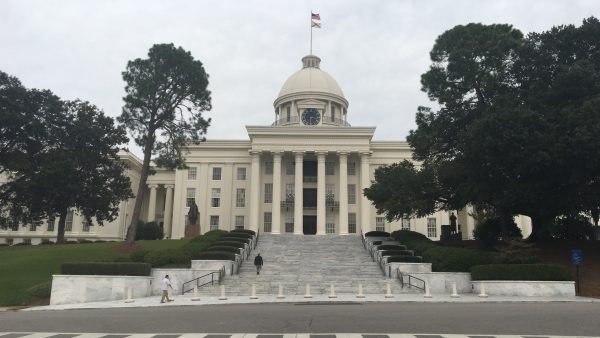Republicans target immigration in legislature’s opening week
Republicans hit the ground running as the Alabama legislative session started this week. Among their top priorities is a package of immigration bills, which advanced out of committee and onto the Senate. We talk about that and other action this week with Todd Stacey, host of Capital Journal and Alabama Public Television.
The following conversation has been edited for clarity.
There were several immigration-related bills that went before lawmakers this week. What are some of the things that these proposals would do?
There’s a real focus on immigration this year. I think that is partly coming out of reaction to what’s happening at the federal level. And with Trump coming into office, so much focus on law enforcement and on the immigration space.
Well, the legislature wants to kind of tap into that Trump immigration energy. And so they want to align state agencies and state law enforcement with the federal government to essentially assist the federal government in deportations and things like that.
So you’re seeing things like higher fees on wire transfers, like Western Union, if you’re going to send it out of country. Basically to deter folks from coming here, working here, and sending money back to your home country. And you’re also going to require state and local law enforcement to swab for DNA and collect fingerprints for any illegal alien that is arrested. There are going to be more [bills]. We know that there are going to be more and stricter immigration proposals coming, but those were the first couple that we’ve seen right out of the gate.
These went before a Senate committee this week. They made it to the Senate floor, but no further at this point. What was the debate around these bills like so far?
It’s a debate we’ve heard before. We’ve experienced this way back in 2011 when Republicans took over the legislature. And one of the first things they wanted to do was pass, if you remember, the country’s strictest immigration law. That happened, but it was peeled back quite a bit by the courts through a series of lawsuits. Republicans say they’ve learned a lot since then, and they’ve also watched other states like Texas and California navigate the legal system on immigration.
But it’s the same arguments. Republicans say they want to crack down on those with criminal records and drugs and trafficking and things like that. But you’re also hearing from those immigrants themselves or their advocates and Democrats on the other side saying, this is unfair and it goes too far. Criminals are one thing, but those who are living here undocumented is another. And so they are trying as best they can to slow these bills down. But remember, Republicans have a super majority in the legislature. They get to do what they want, and they seem to have some momentum on this immigration issue.
The Senate on Thursday passed a bill called the “What is a Woman Act.” This is one that transgender rights activists have spoken out against. What does this do?
It essentially declares in state law that there are only two sexes, not genders, but sexes, male and female. But it also includes terms like boy, man, girl, woman, father, male and female. Meaning that when those terms are mentioned in laws and policies and things like that, they have a definition. That’s the kind of technical explanation of this bill.
It obviously plays into this culture war over gender that has been raging in this country, whereas Republicans have a lot of that momentum from Trump and Washington. They’re tapping into that a little bit. But Democrats say this is mean. It’s unfair. It is meant to target or call out anybody that doesn’t conform to traditional gender norms. Again, we hear that argument. This bill has been around for a few years, but I think because of what you’re seeing in Washington, you’re seeing Republicans in Montgomery mimic a lot of what’s going on in Washington, D .C.
A Senate committee delayed a bill that would have allowed the state to borrow an additional half billion dollars to build a prison in Escambia County. Put this into some context. Why might the state have to borrow so much money for a prison?
Yeah, because we write a headline like that and it’s like, “Oh my gosh, why are they doing this?”
When they originally passed the law to build two new state prisons, there was always the plan to borrow the money. It’s such a giant project. You typically borrow money for that. You bond it out. But when they went to market, this was a couple of years ago, there was so much pushback from social justice groups basically pressuring financial institutions, banks, to not buy these bonds when they went to market. It was pretty effective. I think they only got about 60%, maybe 70% of the capital they were looking for. They had always planned on maybe going back to the bond market when things calmed down.
It certainly is not the same political environment that it was two or three years ago. Perhaps going back to the bond market could help them pay. The reason why it’s important is if they don’t borrow the money, then they have to take that money out, a greater amount of that money out of the General Fund every year just to pay directly for construction costs. That eats up into other General Fund costs like Medicaid, transportation, the prison budget to begin with. Go down the list. They’d rather pay lower price long term and not have to continually draw on the General Fund year after year.
Finally, it’s been almost four years since lawmakers authorized a medical cannabis program, yet those who need it still can’t buy it in Alabama. The licensing process has been mired in lawsuits and legal wrangling. Now there’s a bill that purports to fix that process. Todd, what does this entail?
Senator Tim Nelson, he’s the sponsor of the original medical cannabis law. He’s not the only one frustrated. The entire legislature, I think, is frustrated. They kind of went out on a limb and passed this medical marijuana law. Three years later, not one person has gotten the product because of all the lawsuits. It was kind of a flawed process from the beginning.
What Nelson wants to do is just expedite the process. Let’s hire a professional company, get them going, go ahead and get these last licenses out the door. Let’s get the courts out of it. He’s attempting to fix the issue that has caused all the lawsuits and get the process going. We’ll see how that works.
What’s interesting is the leader of the medical cannabis commission, John McMillan, isn’t resistant to that at all. He said he’s fine with it. It’s time to do something because this process has just gone on way too long.
Auburn fires coach Hugh Freeze following 12th loss in his last 15 SEC games
The 56-year-old Freeze failed to fix Auburn’s offensive issues in three years on the Plains, scoring 24 or fewer points in 17 of his 22 league games. He also ended up on the wrong end of too many close matchups, including twice this season thanks partly to questionable calls.
In a ‘disheartening’ era, the nation’s former top mining regulator speaks out
Joe Pizarchik, who led the federal Office of Surface Mining Reclamation and Enforcement from 2009 to 2017, says Alabama’s move in the wake of a fatal 2024 home explosion increases risks to residents living atop “gassy” coal mines.
‘It’s like feeling the arms of your creator just wrapped around you’: a visit to a special healing Shabbat
Members of Temple Emanu-El in Birmingham gathered recently for their traditional Friday Shabbat service. But this particular service was different, as could be seen by all the people dressed in their finest pink.
Space Command is coming to Huntsville. What might that mean for first-time homebuyers
While Huntsville has been a more affordable market than other growing cities, what’s it been like for those looking for their first home?
Colorado says relocation of Space Command to Alabama is ‘punishment’ for mail-in voting
The litigation announced by Colorado Attorney General Phil Weiser asks a federal judge to block the move as unconstitutional.
Breaking down Alabama’s CHOOSE Act
It’s been a year since Alabama legislators passed the CHOOSE Act allowing families to apply for state funds to use towards homeschool expenses and tuition for participating private schools. The Alabama Daily News’ education reporter Trisha Powell Crain has been diving into how the funds are being used. WBHM’s Andrew Gelderman sat down with her to talk about what we’re seeing so far.









